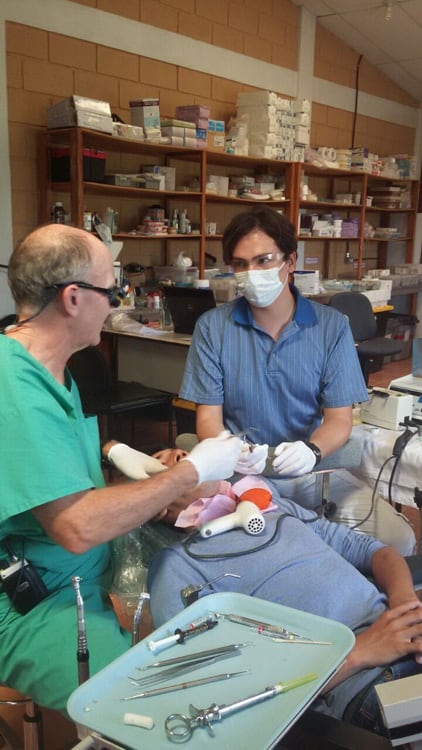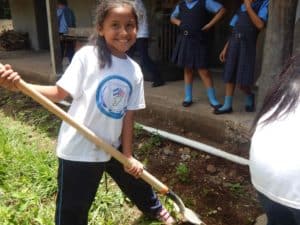Laura and I at an earlier time in our Honduran experience used to frequently walk by a dental clinic. The dentist there was very friendly and would wave and say hello as we walked by. We’d sometimes see patients going in or coming out. We thought it a bit surreal, however, as many of these patients had very few teeth, and the ones they still had didn’t appear very healthy. One day, the dentist invited us into his clinic. There weren’t any instruments or materials, save for a torturous looking instrument that was obviously designed to yank teeth out. The “dentist,” of course, was not really a dentist, and the “clinic” was not really a clinic. Were we appalled? Well, yes and no.
According to developed world sensitivities, having had professional dental care all our lives, and having been well-trained since youth in the importance of regular brushing and flossing, we would look upon this “dentist” and his “clinic” as archaic and barbaric. Our first reaction might be to call the ADA and have this man’s opportunistic practice closed down. But, this is not a developed world we live in, and perhaps we need to look closer at the context. There is no real dental care here, no programs to teach dental hygiene, and the term ‘dental health’ is an oxymoron. Yet, there are dental issues. People have toothaches. Given such limited resources and options, given a societal consciousness of dental care as pre-professional by developed world standards, what choices really exist? Extractions are the best, if not only, response to bringing relief. There are few voices to cry out against it. In fact there are all sorts of dental brigades that come to Honduras. They’re generally not here to raise the societal consciousness of what constitutes dental health and hygiene. Nor are they here to equip Honduras with the tools and skills to institute systems of periodontal professional care. They are here to pull teeth. So how are these US dentists any better than our friendly “dentist” at his “clinic?” Who is mimicking who? And how would one really go about making dental health a legitimate, sustainable reality in Honduras?
The answer is simple really. All you need is a generation of time and patience, a gargantuan amount of money and resources, professional and technical expertise readily available and disposed to assist, and Hondurans generously taking on an onerous mission that runs opposed to societal structures and practices. Am I being facetious? Well, yes and no.
Jan and Larry Tepe have dedicated themselves to making dental health a legitimate, sustainable reality in Honduras, particularly in the Frontera, for decades. They have garnered and directed the time, money, resources, and professional and technical expertise necessary to reshape the societal consciousness of what dental health is in Honduras. They have given it all away to Hondurans in whom they can do no more than trust will carry on an onerous mission. What a tremendous investment! Has it made a difference?
I suspect when Jan and Larry first started coming to Santa Lucia and Concepción, they did a lot of extractions. Through the decades, they have developed teams of dentists, dental students, dental assistants and hygienists, and other professionals to share in their mission. They also invested in Honduran professionals and dentists to slowly come to an appreciation and sharing of their vision and mission, working shoulder to shoulder. Jan and Larry were recently here again with Beth Deyhle, dental assistant in August. I suspect their time here now was qualitatively different than was their first experiences.
Today, when they come they work alongside two professional competent dentists, Dr. Idalia Ramos in Concepción and Dr. Flor Amaya in Santa Lucia, who run private dental clinics offering care that parallels quality care in the US. For all the years of Jan and Larry’s commitment, Dr. Idalia and Dr. Flor worked as employees of Shoulder to Shoulder. This year, Shoulder to Shoulder enabled the transformation of US subsidized clinics to private, Honduran enterprises. Jan, Larry, and Beth were here to support their work and not to impose their superiority. They are assisting them in obtaining the resources and the competence to manage their practices, and offering them training in promoting their practices as viable and sustainable. Dr. Flor and Dr. Idalia are in turn changing the societal consciousness relative to what constitutes dental health and making it possible for all persons to gain access to quality dental care. The work is not done. Decades have already been committed and further decades will be necessary, but substantial change has already taken place and the foundation is laid for continuing the revolution.
“Open wide!” That’s a loaded phrase, isn’t it? We’ve all heard it, reclining somewhat stiffly back in that odd shaped chair, a bright light blinding us, a bib alligator clipped around our neck, with the masked, white-coated person hovering over us. And we are anxious to what will be found when we open wide and expose ourselves to sharp, probing instruments. But if we do not open wide, if someone doesn’t insist upon it, we see only the surface of things and our remedies for improvement are limited by what is never really looked at or examined. So, perhaps it is best to probe deeper, under the surface and into the cavities where the forces that shape and define us dwell. That does in fact seem to be the work of a dentist. Jan, Larry, and Beth visited our bilingual school while they were with us. Our bilingual school children have benefited from free dental care subsidized by Shoulder to Shoulder for years now. The children smiled for them when they visited; bright beaming smiles of health, well-being, and confidence. All this now because Jan and Larry were not willing to simply look upon the surface. Rather, as the good dentists that they are, they voiced their demand. Open wide!







